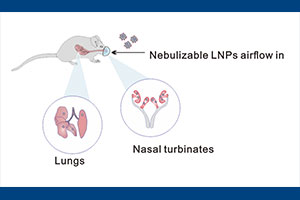
Qianben Wang, PhD, and his team received a two-year, $110,000 Translation Research Grant (TRG) from The North Carolina Biotechnology Center, effective Jan. 22nd, 2024, to develop an inhalable nanoparticle capable of delivering a safe, RNA-targeting gene therapy to ward off coronaviruses, including SARS-CoV-2. The grant is allocated specifically for mouse studies. His team’s long-term objective is to deliver the inhalable treatment via various types of nebulizers, including handheld and portable ones, to humans.
Continuous evolution of SARS-CoV-2 variants has led to a rapid and simultaneous emergence of numerous variants, making the next infection waves unpredictable. Development of new strategies remains an urgent need. Coronaviruses, including SARS-CoV-2, rely on the engagement of host proteases for entering the human cells and infection. The treatment will counteract the host protease, aiming to prevent and treat infections caused by SARS-CoV-2 and its variants, and potentially other coronaviruses as well.
The grant represents a milestone in The Wang Lab’s endeavors to advance scientific discoveries towards commercialization opportunities, particularly in their new study area of antiviral therapeutics.

The TRG project is a team-driven effort. Wang is the Principal Investigator, joining forces with Pulmonologist Lingye Chen, MD, with Duke Department of Medicine, Division of Pulmonary, Allergy, and Critical Care;Technology Transfer Officer Christy Ferguson, PhD; Business Case Adviser Michael Hannan, MBA, HSM, with Duke Office for Translation & Commercialization; and his lab’s research scientists Hongyan Wang, PhD, and Zhifen Cui, PhD.
Wang’s team has pioneered the host gene nanoparticle therapy to combat SARS-CoV-2 infection, detailed in their work published in Nature Chemical Biology in July 2022; and their work has been featured in mainstream media like ABC-11 News (WTVD-TV) ); CBS-17 News (WNCN); and the Telegraph (United Kingdom).